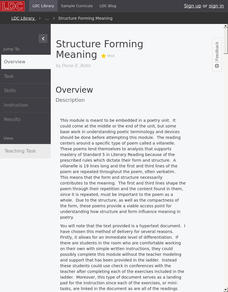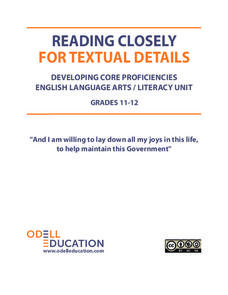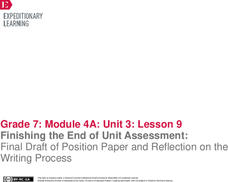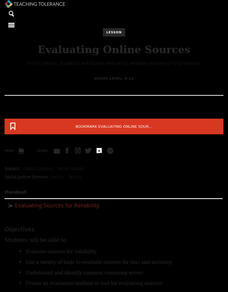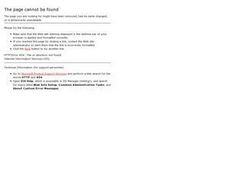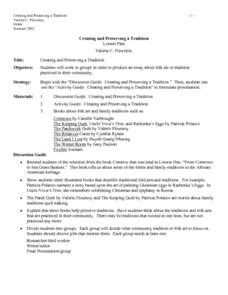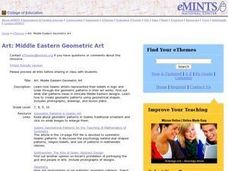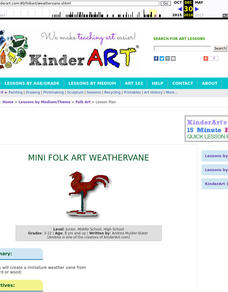College Board
2004 AP® English Language and Composition Free-Response Questions Form B
Are there unspoken rules everyone should follow? Questions from the 2004 AP® English Language and Composition Form B ask scholars to give opinions on how unspoken rules help people belong in society. Pupils also analyze a writer's...
Odell Education
Reading Closely for Textual Details: Grades 9-10
Pupils work in small groups to answer guided questions and discuss the details they found. They also read independently, improving strategies they learned to approach and question text.
Literacy Design Collaborative
Structure Forming Meaning
Teach literary lovers how to form opinions about form. Scholars read
informational text about the form used in villanelles. After analyzing
the structure used in the poetry with graphic organizers and gallery
walks, writers create...
Odell Education
Reading Closely for Textual Details: "And I am willing to lay down all my joys in this life..."
Look closely, some details are hidden! Scholars learn how to find attributes by first examining characteristics in illustrations and then move to locating details in text with close reading. The teacher models good practices for...
Literacy Design Collaborative
Catching a Grenade: How Word Choice Impacts Meaning and Tone
Beyonce's "Halo" and Bruno Mars' "Grenade" provide eighth graders with an opportunity to consider how a writer's choice of words can create a very different tone even when the subject is the same. After a close reading of both lyrics,...
EngageNY
Performance Task: Readers Theater Performance
It's show time! Scholars finalize their learning by performing their Reader's Theater script of To Kill A Mockingbird. As groups of actors perform, the remaining pupils give feedback using a rubric. After all groups finish, each person...
EngageNY
Close Reading to Learn about Lyddie’s Character
Scholars work in pairs to analyze the characters, plot, and setting of Katherine Paterson's novel, Lyddie. Next, they apply what they learned about the characters' feelings and motivation to perform a mini reader's theater.
EngageNY
Finishing the End of Unit Assessment: Final Draft of Position Paper and Reflection on the Writing Process
Think about it. Writers think about their end of unit essays through reflection. They use the End of Unit 3 Assessment, Part 2: Reflection on the Writing Process handout to analyze the writing process they used to create their...
EngageNY
Final Performance Task: Sharing Visual Representations of Position Papers
Let's take a stroll! Scholars go on a gallery walk to view the visual representations for the performance task created by the class. They then view a variety of books about environment and sustainability and conduct book talks on the...
EngageNY
Inferring about Character: Getting to Know Percy (Chapters 1 and 2)
What a character! Scholars look at two chapters in The Lightning Thief to make inferences about the character Percy. They record both the character's challenges and responses. Learners then work in their triads to discuss the gist...
EngageNY
Analyzing, Comparing, Sharing: Modern Voices
What do modern voices sound like? Scholars explore the topic, reading two concrete poems from John Grandit's Blue Lipstick and analyzing them using a graphic organizer. Next, they read a third poem and work with partners to look for...
Teaching Tolerance
Evaluating Online Sources
Newspapers, television, social media ... how do people get their news? Using the informative resource, scholars locate and verify credible sources of information. Working in small groups, they discuss strategies for evaluating the...
EngageNY
Researching Information about Sustainable Fishing
Go fish! Scholars continue using their research skills to find factual information to use in their consumer brochures about overfishing. They work in triads to research information about sustainable fishing practices and share their...
K12 Reader
Alliteration Animals
Bees buzz, dogs dig, lion laze, and snakes slither! Use alliteration to create sentences about four different animals.
Curated OER
Book Report Task Cards
With 52 task cards, learners will not run out of things to do with a book they are reading independently or with the class. Tasks include making a poster on a specific topic, writing a summary, drafting a sequel, creating a windsock,...
Curated OER
Cave Paintings: Leaving a Message
Fourth graders create cave paintings to leave behind a message for the future civilizations about how they live today.
Curated OER
I Dig Your Art, Man (or Woman)
Twelfth graders write a thesis regarding a modern artist of their choice for a 15-20 multi-media presentation. In this lesson students create a Power Point, video, or some other visual representation studying an artist or modern artistic...
Curated OER
ANCIENT ART/ABORIGINAL BARK PAINTING
Fifth graders explore Aboriginal art and how it is used in communication and story-telling. They create their own Aboriginal art out of brown paper, incorporating designs and patterns.
Curated OER
Creating and Preserving a Tradition
Students explore folk art and tradition. They work in small groups and produce an essay about folk art or traditions practiced in their community. Students discuss the creation and preservation of a tradition. They discuss various...
Curated OER
Middle Eastern Geometric Art
Students examine how Islamic artists represented their beliefs in logic and order through the geometric patterns in their art works. They analyze star patterns in Middle Eastern designs, and create geometric patterns using geometric shapes.
Curated OER
Creating Artwork to Explain Environmental Change
Students review artwork that relates to the environment and communicates a value. They view and analyze art by Andy Warhol, Eric Carle and Albert Bierstadt and then create original pieces with an environmental theme.
Curated OER
Pop Art: Multiples of Me!
Students discuss major events in the 60's era including conflicts, culture, and history. Students also take a look at artists from this time and discover Pop Art. They then create their own portrait in the Pop Art style using Clarisworks...
Curated OER
Creating Your Own Rock Art
Eighth graders look at early art. In this visual arts instructional activity, 8th graders investigate the attributes of rock art, examine rock art, and create their own examples of rock art. Analysis and instructional worksheets are...
Curated OER
Folk Art Weather Vane
Pupils observe weather vanes and explore their purpose and history and create a miniature weather vane from cardboard or wood.




